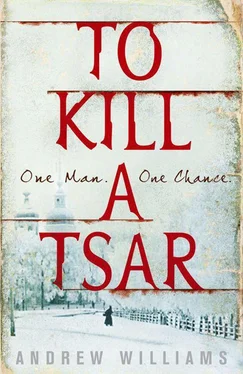Vera was right. A squad of gendarmes was questioning travellers and checking papers on the concourse and Anna was obliged to show hers with the rest. A plume of steam and soot was rising from the mouth of the station and she had barely settled into her seat in third class when, with a hiss and a jolt and a clanking of couplings, the train began to pull away from the platform. Her carriage was crowded with a rich slice of southern Russia: peasants with poultry; a Greek shopkeeper and his family, his small children screaming for the attention of their mother; Jews, Armenians, even a young Muslim man from the Crimea in a bright red Tatar cap. Anna found herself pressed against a middle-aged clerk in a stained and threadbare frock coat who fell asleep almost at once. Opposite her was an old soldier with a thick grey beard and small inquisitive eyes. He gave her a lascivious toothless grin when she caught him scrutinising her and he refused to look away. For a while she followed the comings and goings in the carriage — the officious ticket collector and tipsy vodka seller, the children peeping cheekily through their fingers at strangers — and she listened patiently to the everyday troubles of her neighbours. But the late sun glinting yellow in the glass made her blink and slowly she succumbed to the weariness of the passive traveller, drifting away to the rattle of the train. It was an uneasy sleep, broken at each station along the line by the slamming of doors, the guard’s whistle and the traffic of new passengers up and down the carriage. For hours she floated in that restless demi-world between sleep and consciousness in which dreams are shaped by memories and the images that form and dissipate are familiar. In one, the tsar was waving from his carriage, his long fingers beautifully manicured, a gentle look in his eyes, and he was beckoning to her, ‘Come, come,’ offering her the seat beside him. But she knew he was going to die, that it was too late, that he must die and that if she sat with him she would die too. But would he be suspicious if she refused? Was it her duty to take the seat and die for the people? She wanted to live. What would the others say? No, she must die for them. And she could see the face of the English doctor gazing at her, his hazel eyes full of pain, and she wanted to kiss him and feel his arms wrapped tightly round her. But he turned his back on her and kept walking, and she was furious for showing she cared.
She woke with a start as the train juddered to a halt, her mouth dry, her neck stiff. It was dark and her neighbours were still dozing, blankets pulled up to their chins. She examined her dim reflection in the window, discreetly tidying loose strands of hair. She felt dirty and cold and would have given almost anything for a bath and a comfortable bed. Elizavetgrad was only a little further and it was there she had arranged to rendezvous with Goldenberg and a portmanteau of dynamite. With the bag on the rack above them, she would have to be on her mettle for the rest of the journey. The old soldier opposite was awake and eyeing her intently. She ignored him and gazed out into the November night as the train began to gather speed, wisps of steam whisking past the window like spirits at a witch’s dance. And soon she could see the yellow twinkle of Elizavetgrad and the train began to slow. The plump clerk beside her, who had grunted and snuffled in his sleep for most of the journey, stirred as if an unseen hand was shaking him roughly to give notice the city was only minutes away. Placing his hands on his knees, he hoisted himself groggily to his feet and reached up for his trunk. Most of the passengers were preparing to leave the carriage. It would make it easier for her to pass unnoticed on the platform.
From the edge of the platform, Captain Alexander Zabirov could hear the rails singing and knew the train was only minutes from the station. He glanced at the waiting-room door then a little way beyond it to where he knew his men were waiting in the darkness beneath the canopy for his signal.
‘You’re sure he’s in there, Turchin?’ he said, turning to the sergeant at his side.
‘Quite sure, sir. He’s not going far with that trunk.’
‘Very good.’
It was Turchin who had noticed the Jew struggling along the platform with a heavy portmanteau. A small man with wispy red hair and a goatee beard, dressed in an old student coat, he had stepped off the Odessa train at a little before six o’clock that evening and taken refuge at once from the bitter chill. Ordinarily, Turchin would have presumed he was on his way to a university in Moscow or Kiev, but he had been briefed every day for a fortnight to be on the lookout for nihilist conspirators at the station. Names and descriptions and even a few photographs had been sent by the Third Section to every gendarmerie in the empire: almost at the top of the list was the man pressed into a corner of the waiting room. Turchin had not been able to remember his name but he knew he was wanted for murder and he was too long in the tooth to risk tackling him alone.
‘Where is the next train to, Sergeant?’ asked Captain Zabirov.
‘Kiev, sir.’
‘He may take this one. He’s from Kiev.’
Word of the approaching train must have reached the waiting room because the door opened and people began drifting out and along the platform.
‘He’ll be armed,’ Zabirov muttered to himself. Then to the sergeant: ‘All right, let’s take a look.’
They moved towards the waiting room, but after only a few steps they saw their man through the lighted window. He bent down and a moment later a battered leather trunk appeared in the half open doorway. He was pushing it with his foot. How fortunate that he is going to have his hands full carrying his luggage, the captain thought with a wry smile. He touched the sergeant’s sleeve and whispered: ‘Stop. We’ll let him drag that thing to us.’
The end of the platform was almost lost in a hissing cloud as the train rumbled into the station. As the steam began to clear Anna leant closer to the window in the hope of catching a glimpse of Goldenberg’s diminutive figure.
‘You got someone meeting you?’ It was the nosy veteran with his twinkling little eyes. His voice was husky with age and he spoke with a hard ‘e’ that suggested he had spent a good deal of time in the Caucasus.
‘Yes.’
‘A friend?’
‘Yes. A friend.’
‘You from these parts?’
‘No.’
‘Here, let me carry your bag.’ He reached down for the small leather suitcase at her feet.
‘No. No, thank you,’ she said firmly, leaning down quickly to lift it from the carriage floor. Turning to join the queue for the door, she could sense his hard inquisitive eyes boring into her back.
The train drew to a halt, the carriage door opened and the Greek shopkeeper in front of her began coaxing his sleepy-looking children down the steps on to the platform. In the dim yellow gaslight, friends and family waited, warmly wrapped against the cold of the November night, their faces lost in clouds of freezing vapour.
As she edged closer to the door Anna was surprised to see their attention was fixed not on the travellers decanting from the carriages but on the smoking head of the train. There was a murmur of excitement and one of the porters climbed on his trolley for a view over the press. Seconds later a gendarme and one of his men pushed carelessly past.
‘Bit of trouble.’ It was the voice of the old soldier. Ignoring him, Anna stepped off the train and began to shuffle through the throng towards the commotion. She caught words and snatches of conversation between those tall enough to see what was happening: the gendarmes had arrested someone. There had been a struggle. Who was he? A thief or a murderer?
She had to be sure. The attention of those waiting on the platform began to turn to the friends they were meeting from the train. The entertainment was over and the porters were in search of custom again, the train guards shutting carriage doors for departure, the travellers gathering their bags and drifting towards the station hall. As the platform cleared she saw a squad of gendarmes in their sky-blue coats at the door of a waiting room. Close by, the steaming black engine, its driver and the fireman smoking and chatting on the platform, intrigued by the little scene unfolding before them. The shrill blast of a whistle, then another, and they hauled themselves back into the cab. A moment later there was a whoosh of steam and soot and the driving rods began to turn.
Читать дальше












